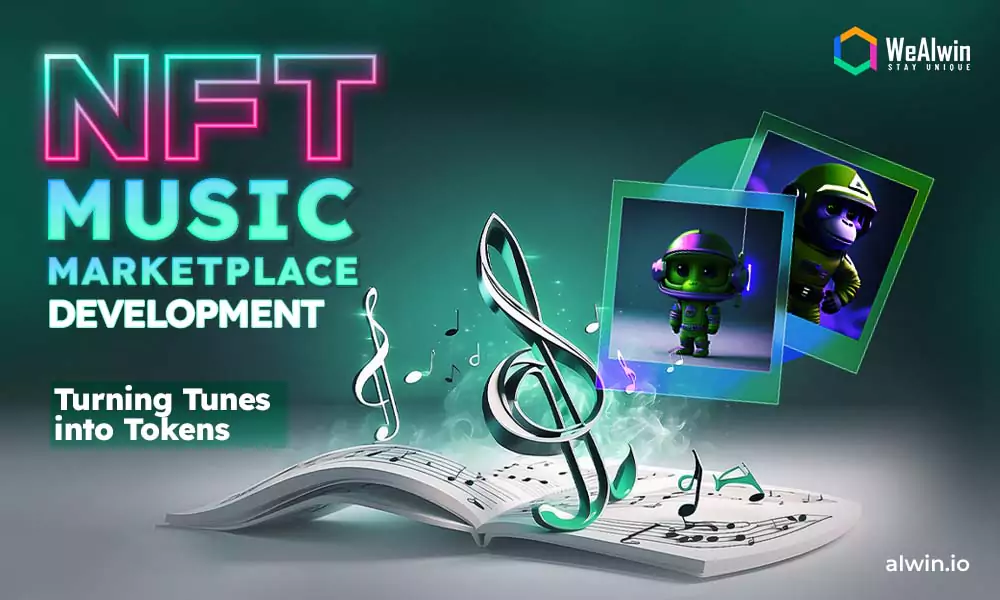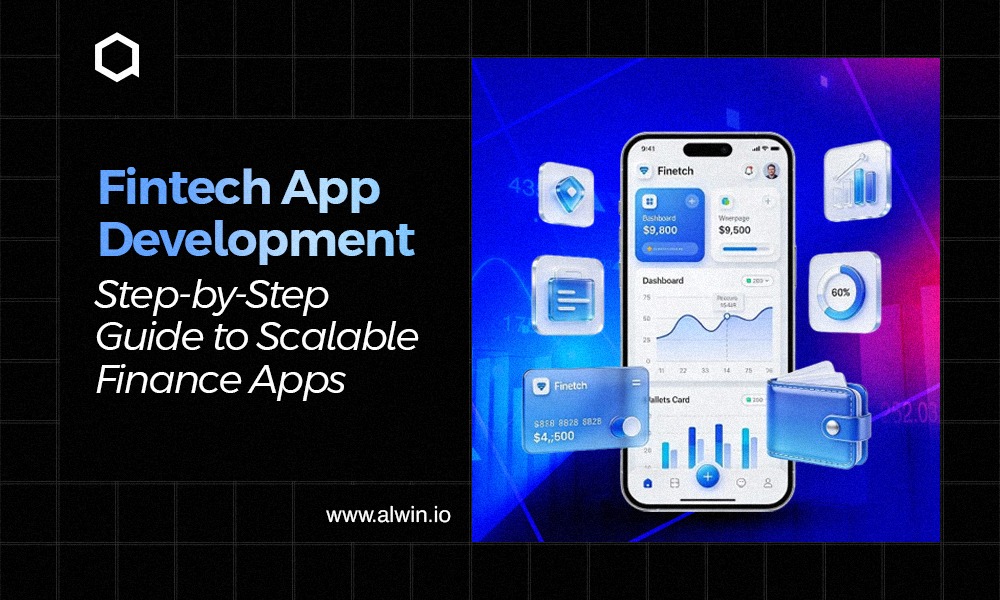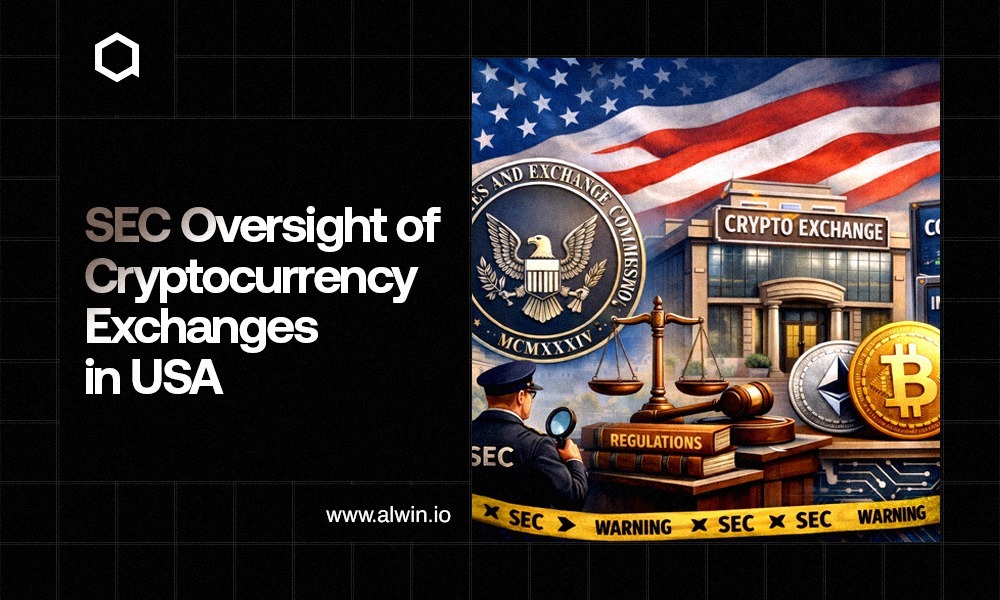In the ever-evolving music industry, artists and fans alike face challenges such as limited revenue streams, piracy, and a lack of direct engagement. Traditional platforms often struggle to provide fair compensation and control to creators. Enter the NFT music marketplace—a revolutionary solution for startups and entrepreneurs looking to address these issues. By leveraging blockchain technology, NFT music marketplaces offer a new way for artists to monetize their work, ensuring authenticity and ownership, while giving fans exclusive access to unique content.
This innovative development not only empowers artists but also opens up exciting business opportunities in a rapidly growing digital landscape. Let's explore how building an NFT music marketplace can be the game-changing solution your startup needs.
NFT Music Marketplace Development
Developing an NFT music marketplace platform to buy, sell, or trade NFT in the case of music, which could be a track, album, or any musical content. It offers artists a revolutionary way to distribute and sell their music as a digital asset and engage with fans, while also providing fans with exclusive ownership of digital content. There are different types of music NFTs available on these platforms like
1. Single Tracks:
Individual songs are released as unique tokens, allowing fans to own a piece of music history.
2. Albums:
Entire albums can be minted as NFTs, often including exclusive content not available elsewhere.
3. Limited Edition Releases:
Special releases or limited runs of tracks and albums, increasing scarcity and value include unique elements such as signatures, personalized messages, or access to future events.
4. Music Videos:
Exclusive or unreleased music videos are offered as NFTs.
5. Album/Track Covers:
Artwork associated with music releases provides visual value alongside audio.
6. Performers’ Photos:
Unique images include candid shots, tour photos, or exclusive portraits, offering fans a visual connection to their favorite musicians.
7. Concert Tickets:
Digital tickets to live events, potentially including special perks or access.
Why Choose Music NFT Marketplace Development for Your Business?
The shift towards NFTs in the music industry offers significant benefits for both musicians and fans, creating new avenues for revenue and engagement.

How Musicians Benefits From NFT Music Marketplace Development
More Efficient Revenue Management:
NFTs enable direct sales to fans, reducing the need for intermediaries and allowing artists to retain a larger share of profits. This direct-to-fan model simplifies the revenue stream, making it easier for artists to manage and allocate funds.
Faster Music Releases:
Artists can release music directly to their audience without delays, fostering closer connections with fans. This immediacy allows artists to respond to market trends and fan demands more quickly, keeping their content fresh and relevant.
Ownership Protection:
Blockchain technology ensures that the ownership and authenticity of digital content are secure, preventing unauthorized reproductions. This is crucial in an industry plagued by piracy and unauthorized distribution, providing artists with peace of mind.
More Creative Freedom:
Artists can experiment with unique and innovative formats, offering fans exclusive experiences that go beyond traditional releases. NFTs can include interactive elements, such as virtual reality experiences or digital collectibles, expanding the creative possibilities for musicians.
How Fans Benefits From NFT Music Marketplace Development
Ownership of Unique Content:
Fans can own rare and exclusive music assets, from unreleased tracks to special edition albums. This sense of ownership enhances the fan experience, allowing them to feel more connected to the artists and music they love.
Resale Opportunities:
NFTs can be resold on secondary markets, potentially at a profit, depending on demand and scarcity. This not only benefits the original buyer but also creates a dynamic marketplace for music collectibles.
Access to Exclusive Experiences:
NFT owners might receive access to private concerts, meet-and-greets, or exclusive content. This added value can enhance fan loyalty and provide memorable experiences that go beyond the music itself.
Direct Support of Creators:
By purchasing NFTs, fans directly support their favorite artists, fostering a closer connection. This direct financial support can be particularly meaningful for independent artists or those looking to fund new projects.
Features of a Music NFT Marketplace
A robust music NFT marketplace includes various features to enhance the user experience for both buyers and sellers.
Auction Bidding:
Enables users to bid on NFTs, driving up the price and creating competitive buying scenarios. This feature can generate excitement and urgency, encouraging fans to act quickly to secure their desired NFTs.
Fixed Price Listing:
Allows artists to sell their NFTs at a set price, ensuring straightforward transactions. This method is ideal for fans who prefer certainty in pricing and want to purchase NFTs without participating in auctions.
Dutch Auction:
A declining price auction format, is where the price of an NFT decreases over time until a buyer is found. This unique approach can attract buyers looking for bargains, as they can wait for the price to drop to their desired level.
English Auction:
A traditional auction format where bids increase incrementally. This format is familiar to many users and can be particularly effective for selling high-demand or limited edition NFTs.
Ranking:
Lists popular or trending NFTs, helping users discover new and interesting content. This feature can be a powerful marketing tool, highlighting top-selling items or promoting new releases.
Bundles:
Offers collections of related NFTs at a bundled price, providing more value to buyers. Bundling can encourage fans to purchase multiple items, increasing overall sales and enhancing the value proposition for collectors.
Wallet Options:
Integrates various cryptocurrency wallets, making it easy for users to store and manage their digital assets. Providing multiple wallet options ensures that users can choose the method that best suits their needs, enhancing convenience and security.
Revenue Opportunities in NFT Music Marketplace
Monetization strategies in NFT music marketplaces go beyond just selling NFTs. Here are some key revenue opportunities:
Transaction Fees:
A percentage of each sale goes to the platform, providing a steady revenue stream. This fee can be adjusted based on the marketplace's policies and competitive landscape.
Listing Fees:
Charging artists to list their NFTs can be another source of income. Listing fees can be tiered based on the type of NFT or the desired level of promotion, providing flexibility for artists and additional revenue for the platform.
Premium Services:
Offering enhanced features or services for a fee, such as premium account status or promotional tools. Premium services can include highlighted listings, analytics, or access to exclusive marketing opportunities.
Memberships or Subscriptions:
Providing access to exclusive content or features for a recurring fee. This model can generate consistent revenue and encourage long-term engagement from users.
Advertising and Collaborations:
Partnering with brands or other artists to promote content or services within the platform. Advertising can be tailored to the audience, enhancing the relevance and effectiveness of promotional campaigns.
Benefits of NFT Music Marketplace Development
Developing an NFT music marketplace brings several benefits, enhancing both user experience and the value proposition of the platform.
Incomparable Experience: NFTs offer a unique way to interact with music and artists, providing an immersive experience. This digital engagement can complement traditional music consumption, offering new ways for fans to connect with their favorite artists.
Assortment of Music Albums: A wide range of content appeals to diverse musical tastes and preferences. By offering a variety of genres and formats, marketplaces can attract a broader audience and cater to niche interests.
Legacy of the Artists: NFTs can serve as a digital legacy, preserving the work of artists for future generations. This archival value can be particularly important for fans and collectors, ensuring that the cultural significance of music is preserved.
Redeemable NFTs: NFTs can be redeemed for real-world items or experiences, adding tangible value. This feature can bridge the gap between the digital and physical worlds, offering fans unique rewards or merchandise.
Indivisibility: Unlike other digital assets, NFTs cannot be divided, ensuring the uniqueness of each token. This indivisibility is a key feature of NFTs, enhancing their value as collectibles.
Scarcity: Limited edition releases increase the scarcity and potential value of NFTs. Scarcity can drive demand and create a sense of exclusivity, making NFTs more desirable to collectors.
Interoperability: NFTs can be transferred across different platforms and marketplaces, enhancing their utility. This flexibility allows users to trade or showcase their NFTs in various settings, increasing their appeal.
Transparency: Blockchain ensures transparency in ownership and transactions, building trust with users. Transparency is crucial in establishing the authenticity and provenance of NFTs, which are key factors in their value.
Uniqueness: Each NFT is unique, offering something special that cannot be replicated. This uniqueness is a fundamental aspect of NFTs, differentiating them from other digital or physical assets.
Essentials While Developing NFT Music Marketplace
Developing NFT tokens requires careful planning and consideration of various technical and market factors.
Selection of Blockchain: Choosing the right blockchain platform is crucial for ensuring security, scalability, and compatibility. Factors to consider include transaction speed, fees, and the availability of developer tools.
Token Code Compilation: Writing and compiling smart contracts that govern the behavior of NFTs.
These contracts define the rules for minting, transferring, and interacting with the tokens.
Increase in Liquidity: Ensuring that there is enough market activity to allow for easy buying and selling of NFTs. Liquidity can be enhanced through marketing efforts, partnerships, and community engagement.
Defining Mintability Specification: Setting rules for how and when new tokens can be minted. Mintability specifications can include limits on the number of tokens, time-based releases, or other conditions.
Token Burn Specification: Establishing conditions under which tokens can be permanently removed from circulation. Token burning can be used to manage supply and demand, potentially increasing the value of remaining tokens.
Customizable Smart Contracts: Allowing for flexibility in how NFTs are managed and traded. Customizable contracts can include features like royalties, time-based restrictions, or special permissions for certain users.
Deployment on Mainnet: Moving the project from a test environment to the live blockchain network. This step involves rigorous testing to ensure the platform's functionality, security, and stability.
Collection of Music Assets in the NFT Platform
Music NFT platforms can host a diverse range of assets, offering more than just audio tracks.
Vocal Performance: Unique recordings of vocal performances, either solo or collaborative. These performances can be rare or exclusive, offering fans a new way to experience their favorite artists.
Songwriting: Original lyrics and compositions that can be sold or licensed. Songwriting NFTs can appeal to collectors and industry professionals, offering a glimpse into the creative process.
Live Music Concerts: Recordings or live streams of concerts, often with exclusive access. These NFTs can provide fans with a virtual front-row experience, even if they cannot attend in person.
Session Musicians: Recordings featuring session musicians, adding value to the tracks. These NFTs can highlight the contributions of often overlooked musicians, providing additional content for fans.
Online Video Classes: Educational content related to music, such as tutorials or masterclasses. These NFTs can cater to aspiring musicians and educators, offering valuable insights and skills.
Online Music Streaming: Streaming services integrated with the NFT marketplace, providing another revenue stream. This feature can offer fans a convenient way to access music while also supporting their favorite artists.
How to Develop an NFT Music Marketplace?
Developing NFT music marketplace involves several steps. They are
1. Comprehensive Market Research and Analysis
2. Adherence to Legal and Regulatory Requirements
3. User Interface and User Experience Design
4. Initiation of Development Process
5. Creation of Smart Contracts:
6. Integrating and Testing
7. Continuous Improvement and Upgrade
Let's Explore in Detail every Steps Involved in Developing an NFT Music Marketplace,
Comprehensive Market Research and Analysis:
Begin by thoroughly understanding the market landscape. Identify your target audience and analyze existing platforms to understand their strengths and weaknesses. This research helps you identify gaps in the market and opportunities for differentiation. Define the unique selling points of your NFT music marketplace, focusing on what will set it apart from competitors and appeal to artists and fans alike.
Adherence to Legal and Regulatory Requirements:
Navigating the legal landscape is crucial in NFT marketplace development. Ensure compliance with intellectual property laws to protect artists' rights and avoid legal disputes. Familiarize yourself with consumer protection regulations, which safeguard users' interests, and data privacy laws to ensure the security and confidentiality of user information. Legal adherence not only protects your business but also builds trust with your users.
User Interface (UI) and User Experience (UX) Design:
Design a platform that is intuitive, user-friendly, and visually appealing. The UI should make it easy for users to navigate the marketplace, discover new music, and make purchases. Prioritize accessibility to cater to a diverse audience, including those with disabilities. A well-designed UX ensures a seamless and enjoyable experience, encouraging users to return to the platform.
Initiation of Development Process:
Begin the technical development of the platform. This includes setting up the infrastructure, coding both back-end and front-end components, and integrating necessary technologies such as blockchain and payment systems. Collaboration between developers, designers, and other stakeholders is essential to align the platform's functionality with its intended use.
Creation of Smart Contracts:
Develop smart contracts to automate the creation, sale, and transfer of NFTs. These contracts are the backbone of the marketplace, ensuring secure and transparent transactions. They must be coded efficiently and comply with relevant blockchain standards. It's crucial to thoroughly test these contracts to prevent vulnerabilities that could be exploited.
Integrating and Testing:
Integration involves ensuring that all components of the platform—such as smart contracts, UI/UX elements, and payment systems—work together seamlessly. Conduct comprehensive testing to identify and fix any bugs or issues. This testing phase should cover various aspects, including functionality, security, and performance, to ensure the platform can handle real-world usage and provide a smooth experience for users.
Continuous Improvement and Upgrade:
Post-launch, it's vital to continuously monitor the platform's performance and user feedback. Regular updates should address bugs, enhance security features, and introduce new functionalities that keep the platform competitive. This ongoing improvement process helps maintain user engagement and ensures the marketplace evolves with the changing digital landscape.
By following these steps, you can develop a robust NFT music marketplace that caters to artists and music lovers, while also carving out a niche in the burgeoning NFT space.
Tech Stacks for NFT Music Marketplace Development
Selecting the right technology stack is crucial for the success of an NFT music marketplace.
NFT Marketplace developed in various Blockchain:
- Tron
- Stellar
- Tezos
- Corda
- Ethereum
- Multichain
- EOS
- Hyperledger Fabric
- Open Chain
- Quorum
Various Token Standards we used:
- ERC-721
- ERC-1155
- FA2
- TRC-721
- BEP-20
Front-end Framework:
React
Backend Technologies:
Node.js, Django, or Flask
Database Systems:
MongoDB, PostgreSQL, or MySQL
Security Protocols:
SSL encryption, multi-factor authentication, and regular security audits,
Cloud Services:
AWS, Google Cloud, or Azure for scalable hosting solutions
Why Choose WeAlwin Technologies for NFT Music Marketplace Development?
- 7+ Years of Expertise and Experience
- Comprehensive Services
- 100% Customizable Solutions
- Post-Launch Support
By partnering with WeAlwin Technologies, a leading NFT marketplace development company in NFT token and marketplace development, it only meets the demands of today's digital landscape but also positions you at the forefront of the music industry's evolution.
In conclusion, developing an NFT music marketplace is a great choice for startups and entrepreneurs.
Contact our experts today to start your journey into the world of NFT music marketplaces!
FAQ
What is a Non-Fungible Token?
A Non-Fungible Token (NFT) is a unique digital asset that represents ownership or proof of authenticity of a specific item, such as music, art, or other digital content. Unlike cryptocurrencies, NFTs are not interchangeable, meaning each one is distinct and cannot be replaced by another.
Time Taken to Develop an NFT Music Marketplace?
The development time can vary depending on the complexity of the platform and the features required, typically ranging from a few months to over a year. Factors influencing the timeline include the scope of the project, the technology stack chosen, and the need for custom features.
What are the Use Cases of NFTs in the Music Industry?
NFTs can be used for selling music tracks and albums, exclusive releases, concert tickets, and even as a means for fans to support their favorite artists directly. They offer a new way for artists to monetize their work and for fans to engage with the music industry.



